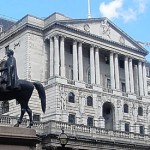The Bank of England has raised interest rates for the first time in more than decade, reversing last year’s cut. Members of the Bank’s Monetary Policy Committee voted by a majority of 7-2 to raise interest rates from 0.25% to 0.50%. Sir Jon Cunliffe and Sir Dave Ramsdenboth were the only mebers of the committee […]
 The Bank of England has raised interest rates for the first time in more than decade, reversing last year’s cut.
The Bank of England has raised interest rates for the first time in more than decade, reversing last year’s cut.
Members of the Bank’s Monetary Policy Committee voted by a majority of 7-2 to raise interest rates from 0.25% to 0.50%.
Sir Jon Cunliffe and Sir Dave Ramsdenboth were the only mebers of the committee that voted to leave borrowing costs at the current record low of 0.25%.
Interest rates were lowered to 0.25% in August 2016 to help boost the economy following the shock Brexit vote. It was the first interest rate cut since 2009 when the financial crisis was at its peak.
British inflation rose to 3% in September, its highest level in more than five years.
Following the EU referendum the value of sterling plummeted, pushing up import costs, which in turn boosted consumer prices and caused inflation to increase.
The MPC said it still expects inflation to peak higher than this at 3.2% in October as the past depreciation of sterling and recent increases in energy prices are passed on to consumers, before falling back over the next year.
The Bank of England governor Mark Carney said the rise was driven by the need to bring inflation back down to its 2% target.
He said: “It’s not so much where inflation is now, but where it’s going that concerns us.”
“In many respects the decision today is straightforward: with inflation high, slack disappearing and the economy growing at rates above its speed limit, inflation is unlikely to return to the 2% target without some increase in interest rates.”
In the minutes of the meeting the Bank warned that Brexit was having a “noticeable impact on the economic outlook”.
The MPC said: “Uncertainties associated with Brexit are weighing on domestic activity, which has slowed even as global growth has risen significantly.
“Brexit-related constraints on investment and labour supply appear to be reinforcing the marked slowdown that has been increasingly evident in recent years in the rate at which the economy can grow without generating inflationary pressures.”
The move will affect around five million borrowers who will now face higher mortgage payments.
Following the hike TSB and Yorkshire Building Society both announced they were raising their mortgage rates.
Earlier this week, Nationwide said that in the event of a rate hike it would increase its variable rate mortgages accordingly.
June Deasy, head of mortgage policy at UK Finance said the majority of borrowers will be protected from any immediate effects of the rise because they have a fixed-rate mortgage.
She said: “Over the last year, two thirds of first-time buyers have opted to fix their rate for up to two years, with a further one in four opting to fix for two to five years.
“Given that variable rate lenders assess the ability of applicants to pay at much higher interest rates, most should be able to cope with any increases as they filter down.
“Rates remain very low by historical standards and borrowers remain well placed to get a good deal from the UK’s increasingly competitive mortgage market.”
Howard Archer, chief economic adviser to the EY ITEM Club, said that interest rates were unlikely to go up again in the near future.
He said: “We suspect that it will be some time before the BoE raises interest rates again. There is still little evidence of pay growth picking up despite the tightness of the labour market, and there looks to be a very good chance that inflation will fall back markedly during 2018 as the impact of sterling’s sharp drop over the second half of 2016 increasingly fades. Meanwhile, the economy is still subdued while Brexit uncertainties cloud the outlook.
“Furthermore, given that this is the first interest rate hike since 2007, the MPC may well feel a need to sit tight for an extended period to see how consumers and businesses respond.”














